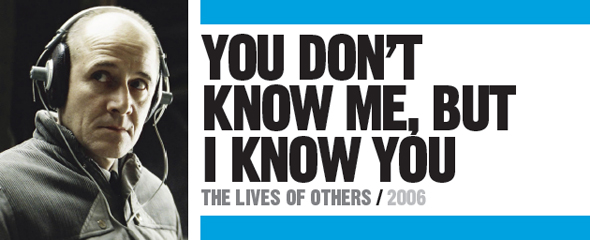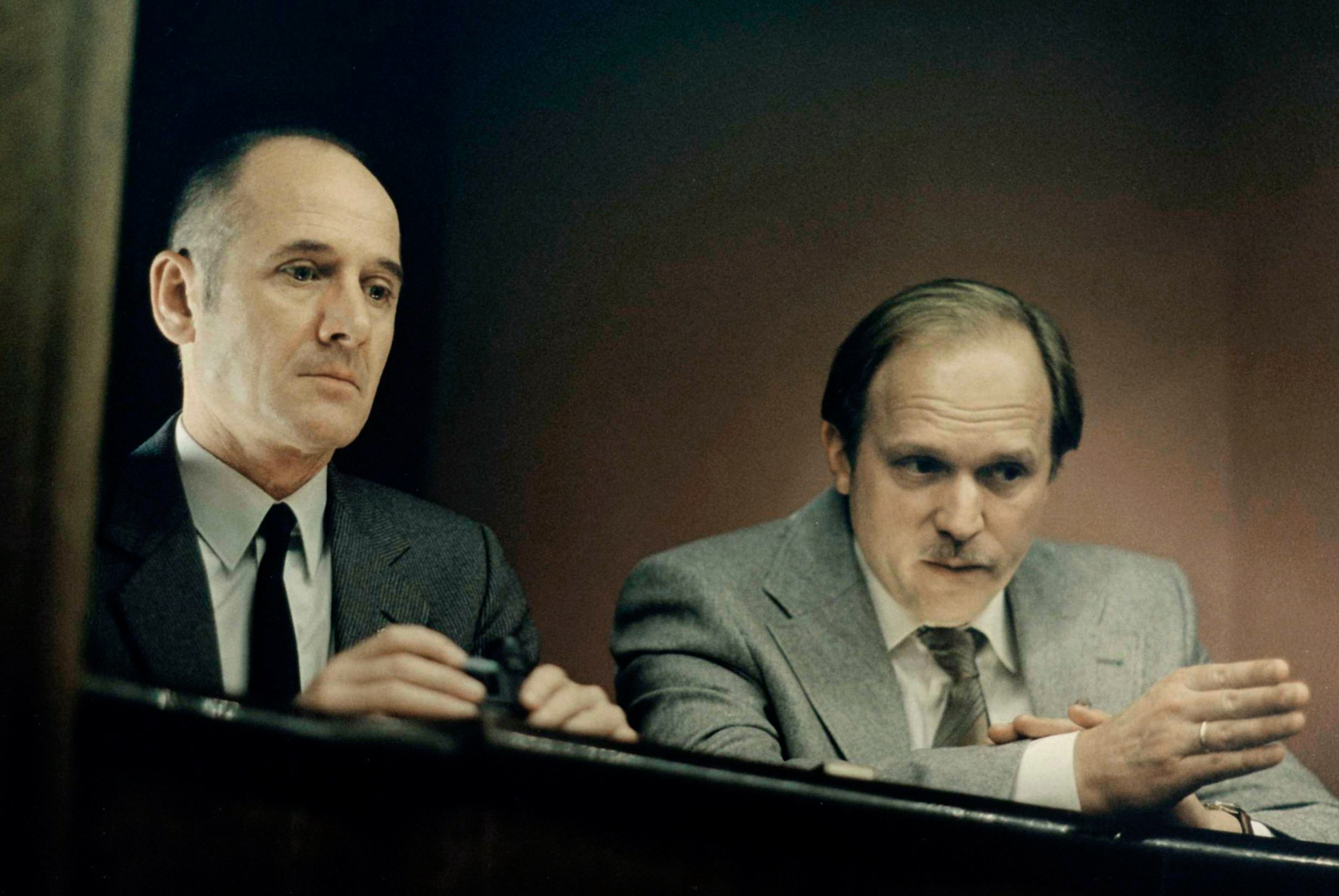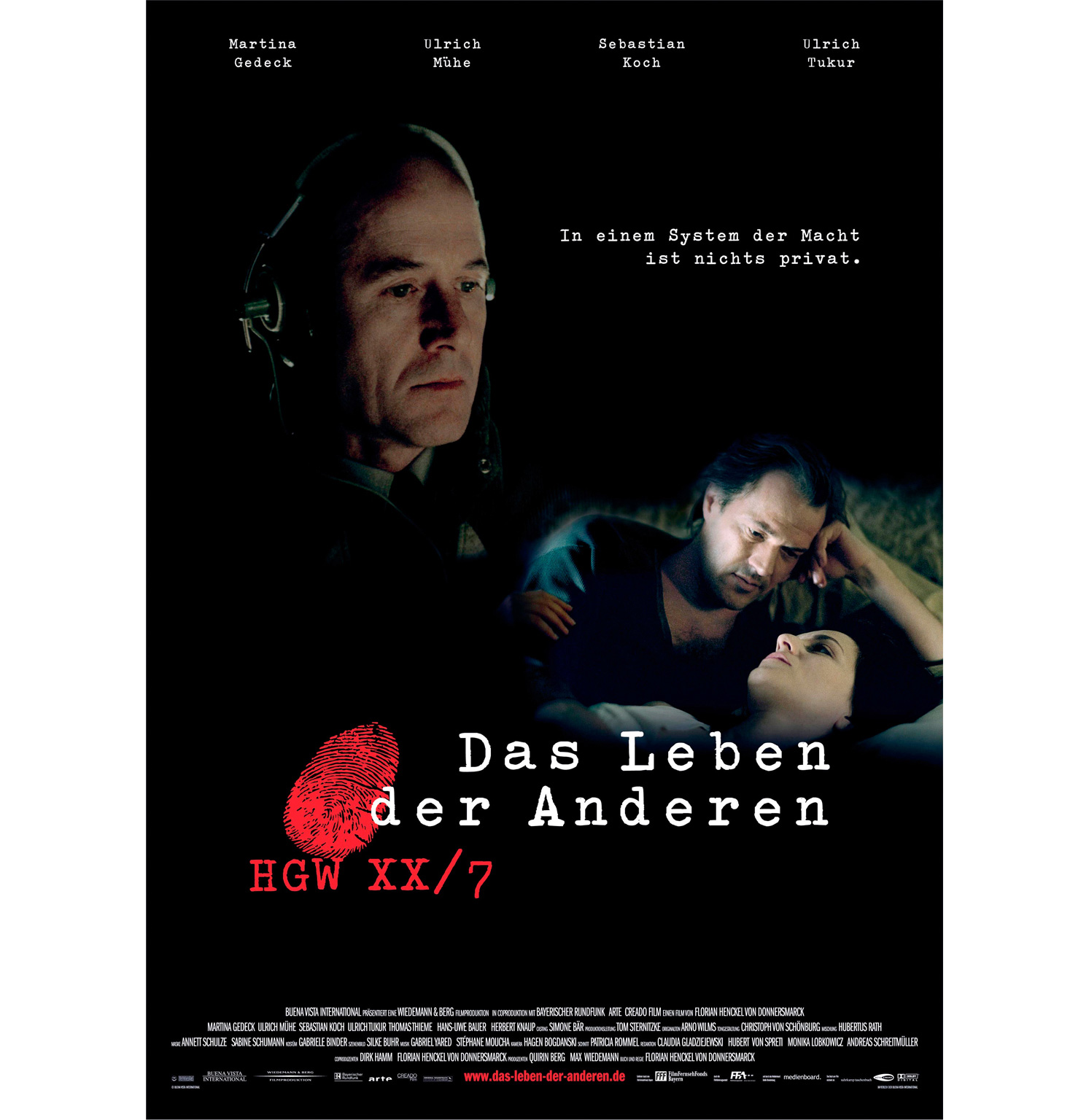The Movie Book (Big Ideas Simply Explained) (2016)


IN CONTEXT
GENRE
Drama
DIRECTOR
Florian Henckel von Donnersmarck
WRITER
Florian Henckel von Donnersmarck
STARS
Ulrich Mühe, Martina Gedeck, Sebastian Koch, Ulrich Tukur
BEFORE
1989 Ulrich Mühe stars in Spider’s Web, West Germany’s last submission to the Academy Awards before the country’s dissolution in 1990.
2003 Wolfgang Becker’s Good Bye Lenin! is a comedy about the reunification of Germany.
AFTER
2008 The Baader Meinhof Complex tells the story of far-left West German militant group the Red Army Faction.
The Lives of Others was inspired by an image formed in the mind of German director Florian Henckel von Donnersmarck. He pictured a secret policeman, inert and gray-faced, headphones clamped to his ears, listening in on the lives of others because it was his duty to “know everything.” Was it really possible, Donnersmarck wondered, that this policeman could remain unsentimental about the private lives under his surveillance?
Set in East Berlin in 1983, this powerful movie offers a glimpse into the workings of the Stasi, the secret police of East Germany’s Communist regime. It was one of the first serious attempts to capture the day-to-day hell of the East German state, in which people attempted to live normal lives without the right to privacy or individual thought.
The listener in the attic
The story centers around a model Stasi officer, Gerd Wiesler (Ulrich Mühe), who is given the routine job of finding incriminating material on a playwright, Georg Dreyman (Sebastian Koch), by spying on him and his lover, the famous actress Christa-Maria Sieland (Martina Gedeck). Installed in the roof of the couple’s apartment building with his listening equipment connected to microphones hidden in the home’s light switches and walls, Wiesler eavesdrops on the couple’s phone calls, conversations, lovemaking, and arguments. Gradually, he begins to appreciate the basic decency and humanity of Georg and Christa-Maria. When he learns that Georg is being targeted not for any political disloyalty, but because the Minister of Culture lusts after Christa-Maria and wants to eliminate Georg, Wiesler’s idealism deserts him. “Is this what we signed up for?” he asks his amoral superior, Grubitz (Ulrich Tukur).
Georg, however, is indeed having politically disloyal thoughts. As he falls under suspicion for writing a subversive article about the country’s suicide rate, and the government’s callous indifference toward it, for a West German magazine, the Stasi blackmails Christa-Maria into betraying him. And this is where the movie resonated so strongly for many former East Germans. The regime functioned by making everyone complicit in a brutal system, using fear to compel ordinary people to betray their neighbors, colleagues, and families. It forced moral choices between career and love, safety and personal integrity. The movie underscores this psychological pressure and dread with its desolate depiction of East Berlin, a shadowy, nightmare city of invisible eyes and ears.

During an evening at the theater, Wiesler’s boss, Lieutenant-Colonel Anton Grubitz, points out the target for Wiesler’s surveillance.
"You never know, from one moment to the next, what course any of the characters will choose."
A. O. Scott
The New York Times, 2007
Redemption and fall
While The Lives of Others had a particular potency for German audiences, its success in winning the Oscar for Best Foreign Movie proved that its power traveled beyond borders. The venality of the Stasi was familiar to many who had felt the chill of repressive regimes, or who simply feared a surveillance state. And in the story of Georg and Christa-Maria the movie featured a classic tortured romance, with the sad-eyed secret policeman as its mute witness.

The movie was praised for its accuracy, except in one regard. Historians note there is no record of a Stasi agent ever having saved a target.
MODERN GERMAN CINEMA
After the acclaim that greeted the New German Cinema of the 1970s, German movies of recent years have tended to concern themselves with the past. There have, of course, been exceptions, but the most highly regarded German movies of this century have been fascinated by the country’s modern history. The Counterfeiters looked back to World War II, as did Downfall. The terrorism of the 1970s was the subject of The Baader Meinhof Complex (2008), while The Lives of Others and Good Bye Lenin! offered audiences a human take on the dissolution of East Germany.
Key movies
2003 Good Bye Lenin!
2004 Downfall
2006 The Lives of Others
2007 The Counterfeiters
What else to watch: The Spy Who Came in from the Cold (1965) ✵ The Conversation (1974) ✵ Wings of Desire (1987) ✵ Nikolaikirche (1995) ✵ Black Book (2006) ✵ The White Ribbon (2009)